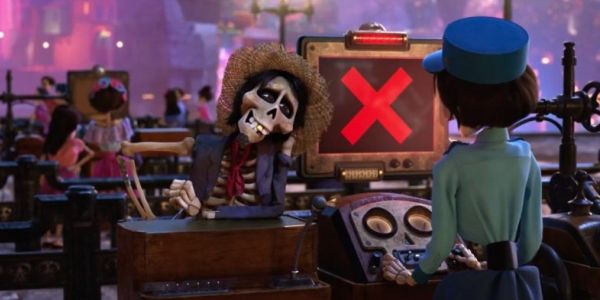Was Coco Right To Include That Incredibly Dark Moment?


The following contains major spoilers for Coco. Come back after you've had a chance to see the film.
Pixar's Coco is a heartwarming story about the importance of family. However, the movie also contains one of the darkest moments in recent memory from an animated film. It's more than a little shocking and may surprise many families who saw the film this weekend. While the lead up to Coco implied that young Miguel's great-great-grandfather was the musician Ernesto de la Cruz, we learn in the film that isn't the case. Instead, it turns out de la Cruz actually murdered Miguel's grandfather, and then, via flashback, we witness the murder, right there on screen. It's dark and violent like little we've seen before from Pixar. Was it too much, or was it exactly what the movie needed?
For those who ignore spoiler warnings, the big twist moment in Coco comes when Miguel discovers that the great musician Ernesto de la Cruz whom he idolizes, and believes might actually be part of his family, actually had all of his great songs written by somebody else, the man named Hector who befriends Miguel early in the film. Not only that, when Hector, who turns out to be Miguel's great-great-grandfather, attempted to leave the musical partnership in order to return to his family, Ernesto poisoned him, stole his songs, and even his guitar. Even Hector didn't realize until that moment that the person he saw as a friend had killed him, thinking his death had been simple food poisoning. The revelation changes everything for Miguel, Hector, and the audience. The moment is jarring enough, but what's more is that we see de la Cruz poison his former friend, and watch Hector collapse and die on screen.
Certainly, animated films, and Pixar movies specifically, have never shied away from depictions of death, even violent death. Finding Nemo opens with the death of the title character's mother at the hands of a vicious predator. Up famously includes the tragic death of Ellie. Both Cars sequels deal with the death of Doc Hudson, and by extension, voice actor Paul Newman.
Outside of Pixar's own history, we have scenes like the death of Bambi's mother, which has scarred more than one generation of children since the 1940s. However, in all of those cases we never actually see the death take place. Especially in the case of Finding Nemo, the death of Coral happens after the screen has faded to black. We discover what happens, it's more than clear, but we never actually see it. Not since The Lion King have we seen a straight up murder committed by an animated character on screen. And even The Lion King, I would argue, is a couple of steps removed from what we see in Coco. First of all, the characters in that movie aren't human, separating the audience from the characters on screen in that way. Secondly, Scar is introduced as a villain from the beginning, so while his killing of Mufasa is still an emotional blow, it's not unexpected.
In Coco, we're dealing with human characters, arguably the most human characters Pixar has ever put on screen. This, combined with the fact that Ernesto de la Cruz is portrayed heroically right up until the reveal, makes the moment all the more shocking.
While the twist revealing Miguel's actual grandfather probably didn't surprise most adults in the theater, the details of Hector's death probably did. While poisoning is a bloodless way to kill a character, the moment still feels incredibly violent. This wasn't Gaston falling to an uncertain fate or Elsa and Anna's parents being lost in a shipwreck. This was first-degree homicide. I was shocked I was seeing it happen in front of me in the middle of this otherwise fairly light-hearted movie. The reveal of the murder would have been enough for the purposes of the story, without actually showing it happen.
Your Daily Blend of Entertainment News
But then, the emotional impact is the point, after all, and if it's not shown, that impact will be greatly lessened. Ernesto de la Cruz gets instantly elevated to one of the great animated villains by virtue of the scene. Hector also changes from being the film's comic relief sidekick to the most sympathetic character in the film. I heard open sobbing during my screening of Coco during the moments when Miguel began to sing to his great-grandmother, and that emotion comes from the heartbreak of knowing what that family had taken from them. Without seeing how it happened, much of that moment's emotional weight would be lost.
Some may not see Hector's death in Coco to be that big a deal, but I found the decision to include it in this way an incredibly brave move from Pixar and director Lee Unkrich. It's a powerful moment, not just in Coco, but in animation. Coco is a true achievement for Pixar, and this scene, however dark it feels, is part of the reason why.

CinemaBlend’s resident theme park junkie and amateur Disney historian, Dirk began writing for CinemaBlend as a freelancer in 2015 before joining the site full-time in 2018. He has previously held positions as a Staff Writer and Games Editor, but has more recently transformed his true passion into his job as the head of the site's Theme Park section. He has previously done freelance work for various gaming and technology sites. Prior to starting his second career as a writer he worked for 12 years in sales for various companies within the consumer electronics industry. He has a degree in political science from the University of California, Davis. Is an armchair Imagineer, Epcot Stan, Future Club 33 Member.
